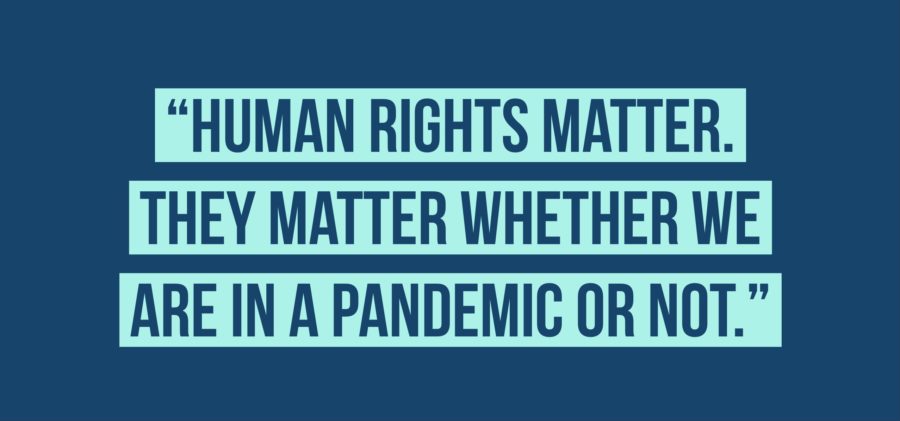There is no doubt that COVID-19 has turned our world upside down. It has brought to the fore – and exacerbated – different forms of inequality. This is especially true amongst high-risk and vulnerable groups. Children and young people have been denied their education. Violence against women and LGBTI persons has increased. Democracy and the rule of law have been undermined in some countries.
Human rights matter. They matter whether we are in a pandemic or not. Human rights are the foundations for sustainable growth, peace and security, and fair and open societies – not an afterthought or something that can be ignored when things get tough.
The Universal Declaration of Human Rights makes it clear that we have an obligation to ensure respect for, and the observance of, human rights and fundamental freedoms for all. But this isn’t enough. We know that the existence of international treaties and resolutions will not necessarily stop countries, groups or individuals from abusing or violating these rights.
A growing trend
Back in the 1980s, Sweden was the first country in Europe to appoint a Human Rights Ambassador. They started a growing trend. Today, eleven European countries have dedicated positions: Estonia, Finland, France, Germany, Lithuania, Luxemburg, The Netherlands, Slovakia, Spain, Sweden and the United Kingdom.
These appointments signal our countries’ strong collective commitment to protecting and promoting international human rights obligations. It also demonstrates that our governments recognise the need to mainstream human rights into broader foreign policy objectives.
Our exact priorities may differ but what unites us is a shared personal and professional passion for human rights. We meet often as a group and issue regular joint statements via social media, because joining forces puts us in a stronger position to stand up against human rights violations and abuses, and better enables us to protect the most vulnerable in society.
Our pledge
We pledge to use our collective voice to:
1. Raise human rights concerns during the pandemic
We will continue to highlight issues of particular concern including shrinking civil society space; combating rising levels of racism and xenophobia; and highlighting the disproportionate impact of the pandemic on minorities, LGBTI persons, journalists, activists, as well as women and girls.
2. Work with and strengthen the multilateral system
We are committed to strengthening the multilateral system so that it can better protect and promote human rights – forums such as the UN Human Rights Council are essential in upholding established global norms and international legal responsibilities.
3. Reach all corners of the globe
Through our visits to and engagement with different parts of the world, we want to encourage dialogue and exchange best practice. We recognise that all countries are different and some may need capacity building support.
4. Ensure no one is left behind
We engage directly with civil society, victims of human rights violations and abuses, businesses, academia, experts and young people around the world to hear first-hand testimonies. We want to share these stories.
5. Protect Human Rights Defenders, even when it is difficult to do so
They have a powerful and unique role but also expose themselves to danger because of the work that they do. We will continue to celebrate their courage and protect them as far as we can.
Together our voices are louder. We will continue to speak out.
Get to know us
Rita French, UK Ambassador for Human Rights
Minna-Liina Lind, Estonia’s Ambassador at Large for Human Rights
Dr Bärbel Kofler, Germany’s Federal Government Commissioner for Human Rights Policy and Humanitarian Assistance
Bahia Tahzib-Lie, the Netherlands’ Human Rights Ambassador
Cecilia Ruthström-Ruin, Sweden’s Ambassador for Human Rights, Democracy and the Rule of Law
“Standing up for human rights, democratic principles and the rule of law is at the core of Sweden’s foreign policy. I am proud to contribute to Sweden’s strong voice in a time of global democratic backsliding. Seeking dialogue and collaborations to advance the rights-based agenda is an important part of my job.” – Cecilia Ruthström-Ruin
Rauno Merisaari, Finland’s Ambassador for Human Rights and Democracy
Anne Goedert, Luxembourg’s Ambassador-at-Large for Human Rights
“The promotion and protection of human rights is a priority for my Government, both domestically and in its foreign policy. As Luxembourg’s Ambassador-at-large for Human Rights, I will be proud to contribute to the implementation of our priorities, including the support for human rights defenders; climate action and human rights; gender equality and the rights of the child.” – Anne Goedert
Delphine Borione, France’s Ambassador-at-Large for Human Rights
“Human rights are at the core of France’s humanist and feminist diplomacy. This includes combatting all forms of violence, inequalities and discrimination, protecting fundamental freedoms and supporting human rights defenders. For me, a daily challenge, partnering with all stakeholders, for a better world for all!”– Delphine Borione
Peter Burian, Slovakia’s Ambassador for Human Rights
“Human rights for all, rule of law and democracy are key elements of prosperity, stability and resilience of societies. Slovakia´s success story of transformation and reforms is a clear confirmation of that. It is a privilege for me to serve as first Human Rights Ambassador for my country and share our experience.”– Peter Burian
Andrius Krivas, Lithuania’s Ambassador-at-Large for Human Rights and Gender Equality
“Human rights are about enjoying freedom, protecting the disadvantaged, appreciating diversity, respecting the dignity of all human beings, and building a prosperous and harmonious society. As Lithuania becomes a member of the Human Rights Council for 2022-2024, I am proud to serve as her Ambassador-at-Large for Human Rights and Gender Equality and to join this dynamic group of European colleagues.” – Andrius Krivas

